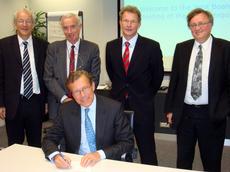Engine of European knowledge-based society
In 1999, Europe's university landscape was dominated by the Bologna Agreement. At the same time, the technical universities of Delft and Aachen, Imperial College London and ETH Zurich teamed up to form the IDEA League. Ten years on, it is the leading European university network for technology and the natural sciences.

It was no coincidence: only a few months after the Bologna breakthrough, which opened up university education throughout Europe and dynamized it like never before, the presidents of four technical universities forged a strategic alliance. The “Memorandum of Understanding” of the IDEA League partners from London, Delft, Aachen and Zurich referred explicitly to the Bologna Declaration. These were universities that had always thought beyond their respective borders: in the face of the boost in internationalization, having strong fellow campaigners was the order of the day.
The chosen label, “IDEA League” (www.Idealeague.org), is composed of the initials of the founder universities Imperial College, TU Delft, ETH Zurich and RWTH Aachen. It stands for the desire to lend the best scientific ideas even more weight as a community. Just imagine: the network is building bridges today that bring around 100,000 students and about 18,000 academic staff members together. Anyone who plays in the IDEA League does not see integration à la Bologna as the objective, but merely as an instrument to stand up to the global competition in the USA and, increasingly, the Far East. In November 2006, Paris Tech – an amalgamation of the eleven leading technical and scientific “Grandes Ecoles” in France – became the fifth and most recent member of the network. The IDEA League recently celebrated its tenth birthday.
From focusing on degree courses…
The long-term objective of the network was to use its clout to gain better access to the EU coffers for research funding, tout for more and better students, and have a greater influence on European education and research policy. However, there was a lot of groundwork to be done first. In the early years, you need to concentrate on creating transparency and comparability among the education systems. In concrete terms, all the partner universities had to negotiate national obstacles, establish common quality standards and admission criteria, and define their study profiles according to the same framework – a crucial step in making students mobile and one of the main aims of “Bologna”.
Up until 2002, throughout the network the profiles of ten study programs were defined in so-called “Diploma Supplements”, i.e. explanatory supplements to the final degree. One result of these efforts stands out: the first trilateral masters program in Europe – a degree in applied geophysics that ETH Zurich, Delft Technical University and the RWTH Aachen offer jointly and which offers the students a unique variety – both culturally and scientifically. Another attractive product to emerge from the cooperation is the IDEA League Summer Schools. So far, PhD students from the IDEA League universities have met nine times to hone their interdisciplinary skills independently in a wide variety of fields – from biotechnology, urban mobility issues, modeling techniques in materials science and information technology to social, self and methodological skills. The IDEA League grants, which have been offered since 2006, also fund this exchange of ideas.
… to agenda-setting for research in Europe
And not to be underestimated: around 20 technical units with management members from all the partner universities that were formed to simultaneously monitor and jointly develop standards. The topics examined range from ethics, teaching quality and equal opportunities to sporting activities and student matters. The latter have been voiced by the IDEA League Student Council “IDEALiSTIC” since 2005.
In the subsequent years, the partners continually expanded the network’s spectrum in the direction of research, innovation and knowledge transfer. The fact that Europe had recognized the punch that can be packed by combining national forces in the continental research sector was no doubt a contributing factor in this. Since 2006, the IDEA League has launched five so-called Excellence Clusters, which inspired research partnerships throughout the network in the fields of energy, environment, health, information technology and mobility. The declared aim is to co-ordinate the research consistently with the needs and requirements of society and the economy, and thus make a contribution towards solving European and global problems.
Joint strength
These excellence clusters paved the way for a new and particularly ambitious project: a “Knowledge and Innovation Community” (KIC) on climate research, which four IDEA League universities and other partners from research and industry proposed to the European Institute of Innovation and Technology (EIT) http://eit.europa.eu/ in the late summer of 2009. The KICs currently embody the most dynamic and prestigious instrument for research funding in Europe. Their specialty: they pool scientific and economic competencies for up to 15 years in order to face the current challenges – in this case climate change. The EIT expects that a KIC will generate annual expenditures of up to 100 million euros in the future, about a quarter of which the EIT will assume itself. Now the members of the “Climate KIC” consortium are eagerly awaiting the outcome of their proposal. The decision is expected to be made in mid-December 2009.
The IDEA League vision can be summed up as follows: “Together we can make a difference”. The university directorates in London, Aachen, Delft, Zurich and Paris have consistently been concentrating on developing strong ties and a comprehensive organizational harmonization over the first ten years – and with great success. The network is now in the starting blocks, ready to help shape Europe’s education and research landscape significantly as a community comprising the continent’s most brilliant technical think-tanks.







READER COMMENTS